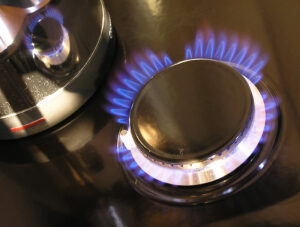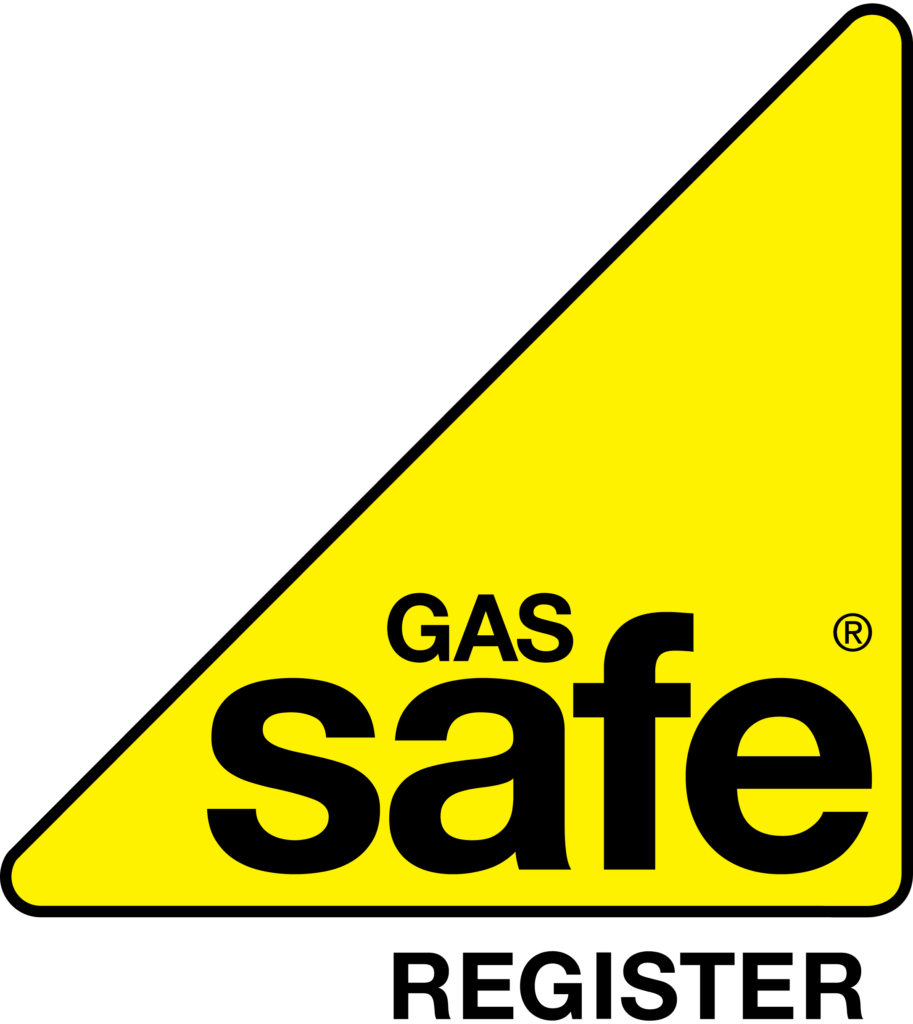Electrical inspection and testing are essential processes used to ensure electrical systems meet safety regulations and operate reliably. These two practices go hand-in-hand to prevent hazards, verify system integrity, and maintain compliance with legal standards.
Table of Contents
ToggleWhat is Electrical Inspection?
Electrical inspection refers to the detailed assessment of electrical systems and installations to ensure they conform to established safety standards. Inspections are typically carried out during installation, before commissioning, and at routine intervals to prevent hazards. Inspectors check wiring systems, distribution boards, grounding, and connections to confirm that all components are correctly installed and safe to use.
These inspections are especially crucial in residential, commercial, and industrial settings where electrical faults can cause fires, injuries, or equipment failures. Inspections ensure that any defects or non-compliances are identified and resolved before they escalate.
What is Electrical Testing?
While inspection involves visual checks, electrical testing uses specialized instruments to measure the performance and safety of electrical components. It includes evaluating insulation resistance, continuity, earth loop impedance, and polarity.
Testing is a more technical process that validates the integrity and safety of the system. Professionals use devices like insulation testers, multifunction testers, and PAT testers to gather accurate readings and generate comprehensive reports.
Why Electrical Inspection and Testing is Crucial
Preventing Hazards
One of the primary goals of electrical inspection and testing is to prevent life-threatening hazards. Electrical faults are a leading cause of fires and electrocution. Routine checks help detect potential issues before they become serious threats.
Ensuring Compliance with Regulations
Electrical systems must adhere to strict regulations like BS 7671 (IET Wiring Regulations). Regular inspection and testing ensure compliance, especially in commercial properties, schools, hospitals, and rental accommodations. Non-compliance can result in penalties, insurance issues, or legal consequences.
Legal Requirements in the UK and Beyond
UK Electrical Safety Standards
In the UK, landlords are legally required to carry out electrical safety inspections every five years or at the start of a new tenancy. This requirement is part of the Electrical Safety Standards in the Private Rented Sector Regulations 2020.
Role of the NICEIC and Other Bodies
NICEIC (National Inspection Council for Electrical Installation Contracting) and similar organizations certify electrical professionals. Their approval ensures that electricians meet the highest standards of safety and competence.
Electrical Installation Testing Explained
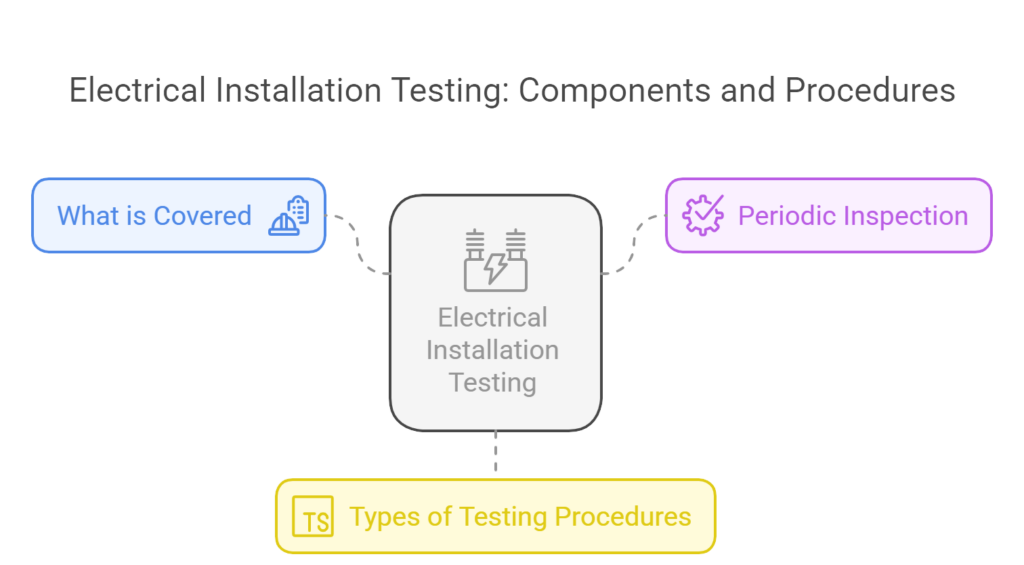
What is Covered During Testing?
Testing of electrical installations involves examining circuit breakers, wiring, sockets, lighting, and distribution systems. It assesses whether components are functioning within safe parameters and identifies any deterioration or unauthorized alterations.
Periodic Inspection and Testing
Periodic inspections are routine evaluations carried out at specified intervals, typically every 5-10 years for homes and every year or two for businesses. The frequency depends on usage, environmental factors, and regulatory obligations.
Types of Electrical Testing Procedures
Initial Verification
Conducted after a new installation, initial verification confirms that all work meets the design and legal requirements before the system is energized.
Periodic Testing
This type ensures continued safety and performance. It’s essential for aging installations and high-usage environments like factories and office blocks.
Portable Appliance Testing (PAT)
PAT testing involves checking appliances such as kettles, computers, and tools to ensure they are safe for use. It’s especially vital in workplaces and rental properties.
Certification: Test and Inspection Certificates
Why Certificates Matter
Certificates serve as legal and professional documentation of a system’s safety and compliance. They are often required during property sales, insurance evaluations, or regulatory audits.
How to Get Certified
Only qualified electricians can issue certificates. After inspection and testing, they complete an Electrical Installation Certificate (EIC) or a Minor Electrical Installation Works Certificate (MEIWC), depending on the work scope.
Courses on Electrical Inspection and Testing
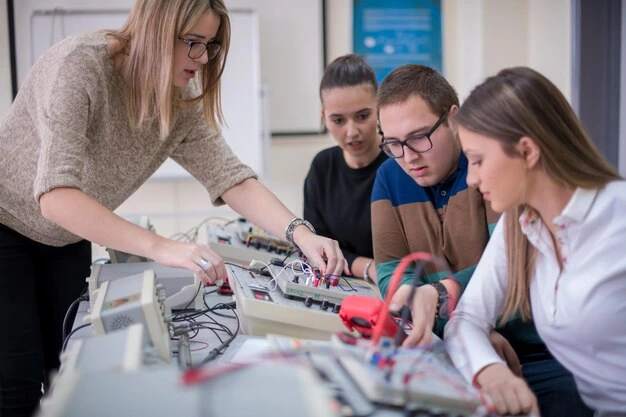
Electrical Testing Course Overview
Courses like the City & Guilds 2391 prepare professionals to conduct inspection and testing in line with BS 7671 standards. These courses teach both theoretical knowledge and hands-on skills using real testing equipment.
Top Inspection and Testing Courses
- City & Guilds 2391-52 – Combines both initial and periodic testing
- Level 3 Certificate in Inspection and Testing
- NICEIC Training Courses – Suitable for experienced electricians seeking certification
Spotlight on 2391 Inspection and Testing Course
2391-52 Explained
This course blends two disciplines: initial verification and periodic inspection. It’s a widely respected qualification for anyone seeking to advance in the electrical industry.
Who Should Take It?
- Qualified electricians
- Electrical contractors
- Individuals pursuing advanced certifications
2391 Course Near Me
Search for approved centers via City & Guilds, NICEIC, or local training providers. Many offer flexible schedules including weekend and online modules.
Examining the 2391 Inspection and Testing Exam
Exam Format
The 2391 exam includes:
- A written test
- Practical assessment
- Online multiple-choice component
Preparation Tips
- Attend mock tests
- Practice with real testing kits
- Review the IET Wiring Regulations (BS 7671)
Online vs In-Person Electrical Testing Courses
Pros and Cons
| Format | Pros | Cons |
|---|---|---|
| Online | Flexible, accessible, often cheaper | Limited hands-on practice |
| In-Person | Hands-on training, direct instructor access | Less flexibility, possibly higher cost |
Choosing the Right Option
Consider your learning style, availability, and course goals. For practical mastery, in-person options are generally more effective.
Career Opportunities After Certification
Becoming an Electrical Inspector
With certification, you can pursue roles such as:
- Electrical Installation Inspector
- Testing Engineer
- Compliance Assessor
Salary Expectations
In the UK, electrical inspectors earn between £30,000 and £50,000, depending on experience and location.
Tools and Equipment Used in Electrical Testing
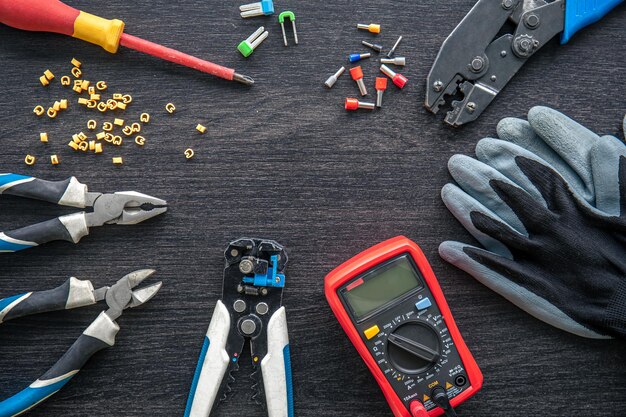
Essential Testers
- Insulation Resistance Tester
- Continuity Tester
- Earth Loop Impedance Tester
- RCD Tester
Safety Gear
- Insulated gloves
- Safety goggles
- Arc flash protection suits
Common Mistakes During Electrical Testing
Misreading Results
Always calibrate equipment and interpret results carefully against benchmark standards to avoid costly errors.
Skipping Steps
Rushing the process can lead to incomplete testing. Follow a structured checklist to ensure thoroughness.
Cost of Electrical Inspection and Testing
Course Costs
Expect to pay between £600–£1,200 for high-quality 2391 courses, depending on the provider and location.
Commercial & Domestic Testing Rates
- Domestic Testing: £100–£250
- Commercial Testing: £250–£1,000 depending on property size and complexity
Finding the Best 2391 Course Near You
Course Providers
Look for:
- City & Guilds certified centers
- NICEIC partner institutions
- Local colleges offering trade certifications
Reviews and Ratings
Check online platforms like Trustpilot, Reddit forums, and Facebook groups to read student reviews before enrolling.
Frequently Asked Questions (FAQs)
1. What is the 2391 inspection and testing course?
It’s a professional qualification that certifies your ability to perform electrical inspections and tests according to BS 7671.
2. How long does the 2391 course take?
Most courses last 5–10 days, including theory and practical elements.
3. Is the 2391 course hard?
Yes, it’s challenging and designed for experienced electricians, but it’s manageable with study and practice.
4. Do I need a certificate to test electrics legally?
Yes. You need a qualification like 2391 or be NICEIC registered to legally issue inspection and testing certificates.
5. How often should a home be electrically inspected?
Every 5–10 years or when there’s a change in occupancy.
6. Can I do the 2391 course online?
Some providers offer blended learning, but practical assessments are usually conducted in person.
Conclusion
Electrical inspection and testing aren’t just technical requirements—they’re vital for protecting lives, properties, and reputations. Whether you’re looking to ensure your home is safe or advance your career through a 2391 course, this guide has equipped you with all the essentials.




